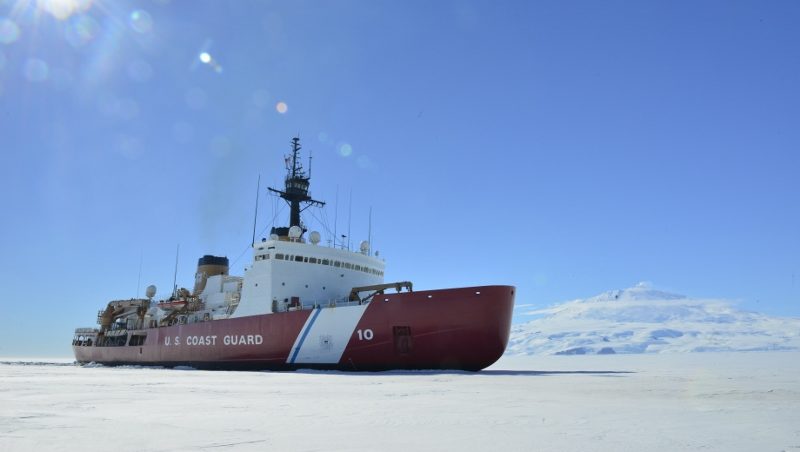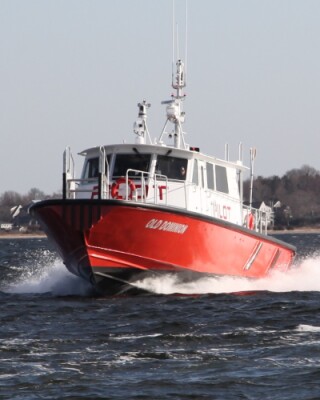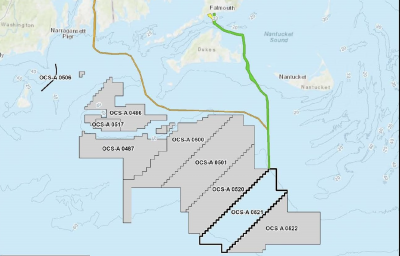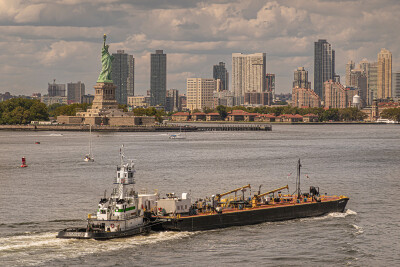The Coast Guard crew of the Polar Star dealt with a gas turbine failure and leaking shaft seal, enabling the 40-year-old vessel – the nation’s sole operating heavy icebreaker – to complete its annual resupply mission to U.S. scientists in Antarctica.
The 399’x83’x31’ Polar Star was bound for New Zealand after completing its mission Feb. 6, cutting a 15-mile channel through ice in the Ross Sea and escorting supply vessels to National Science Foundation research stations. Part of Operation Deep Freeze, the logistical support provided by the U.S. military to the NSF, the Coast Guard role is breaking ice as thick as 10’ to bring in fuel and supplies.
The annual mission south from Seattle has had its share of drama in recent years, as the Coast Guard struggles to keep the Polar Star operational. January 2018 was no exception, and underscored the peril for U.S. ice operations until new icebreakers can be delivered in the 2020s.

Members of the Coast Guard Cutter Polar Star’s engineering department make repairs in the ship’s motor room while in the Ross Sea near Antarctica on Tuesday, Jan. 16, 2018. Coast Guard photo/CPO Nick Ameen.
One of the icebreaker’s three 25,000-hp Pratt & Whitney gas turbines failed Jan. 11, slowing the ship’s progress. Crew members tracked the problem down to a programming issue between the engine and the ship’s aged electrical system, which has had its own issues needing 1970s-era components that Coast Guard engineers recycle from a sister ship, the Polar Sea tied up at Seattle, or obtain on the private market.
Icebreaking operations continued with the turbine idled, and the remaining two muscling through ice. Then on Jan. 16, a shaft seal failed, causing flooding in the cutter’s engine room at a rate of approximately 20 gals. per minute.
The crew responded quickly, using an emergency shaft seal to stop the flow of freezing water into the vessel, and dewatered the engineering space. More permanent repairs to the seal to ensured watertight integrity, and there were no injuries during the episode, Coast Guard officials said.
“If the Polar Star were to suffer a catastrophic mechanical failure, the Nation would not be able to support heavy icebreaker missions like Operation Deep Freeze, and our Nation has no vessel capable of rescuing the crew if the icebreakers were to fail in the ice,” said Vice Adm. Fred Midgette, commander of the Coast Guard Pacific Area in Alameda, Calif., in a Coast Guard statement about the mission. “The crewmembers aboard Polar Star not only accomplished their mission, but they did so despite extreme weather and numerous engineering challenges. This is a testament to their dedication and devotion to duty.”
“Although we had less ice this year than last year, we had several engineering challenges to overcome to get to the point where we could position ourselves to moor in McMurdo,” said Capt. Michael Davanzo, the commanding officer of the Polar Star. “Our arrival was delayed due to these challenges, but the crew and I are certainly excited to be here. It’s a unique opportunity for our crewmembers to visit the most remote continent in the world, and in many respects it makes the hard work worth it.”
The cutter refueled at McMurdo Station Jan. 18 and continued to develop and maintain the ice channel in preparation for two resupply ships from U.S. Military Sealift Command, the Ocean Giant and Maersk Peary. The crew of the Polar Star escorted the vessels to the ice pier at McMurdo Station, an evolution that requires the cutter to travel about 300 yards in front of the supply ships to ensure they safely make it through the narrow ice channel.
The crew escorted the Ocean Giant to the ice pier at McMurdo Jan. 27 and conducted their final escort of the Maersk Peary to Antarctica Feb. 2. The crew then escorted the Maersk Peary safely out of the ice Feb. 6 after supply vessel’s crew transferred their cargo.
The Polar Star departed its Seattle homeport Nov. 30, and is expected to return with its crew of 150 in March.





